Prequel
In order for a non-Macedonian to be able to understand the context, one needs to go way back, when the atmosphere was tense, but significantly slower. The nine-year rule of Prime Minister Nikola Gruevski, president of VMRO-DPMNE (right-wing ruling party with majority in Parliament), led to authoritarian rule, which CSO researchers frequently describe as a cancer which metastases on the judiciary system, the media, the police and most importantly, the election process. At that point, the opposition (social-democrats in coalition with a few smaller political parties) was boycotting the Parliament, declaring the last parliamentary and presidential elections as forgery. The major Albanian political party (DUI) was in coalition with the ruling party and part of the Government as well as different smaller political parties. 20 different categories of citizens (students, professors, part-time honoraria workers, doctors, journalists etc...) were on the streets, protesting separately against the laws and the decision-makers for bad reforms that led the country into poverty, media darkness, and negative reports on the accession to EU.
The lack of census since 2002, created the conditions for spreading misinformation regarding massive emigration which was impossible to confirm. The lack of census also makes fertile ground for the electoral frauds since electorate lists have not been updated. The famous €600m Skopje 2014 project was ongoing and already shaped.
The “bombs”
The mega-scandal arose in February, when leftist opposition scheduled a press conference, revealing the possession of leaked taped conversations, allegedly recorded by the Government and leaked by “common sense people, wanting normal country” (judiciary trials are still ongoing so information on the conversations’ authenticity is still obscure). Over 600,000 taped conversations include more than 22,000 people from the opposition, NGOs, journalists, foreign diplomats, even the ministers themselves. According to the opposition, the taping started since 2007 and is still ongoing. So far, 36 “bombs” were published, revealing a series of crimes committed by the Government (money laundering, murder cover-ups, misuse of power and position, election frauds etc).
The Government, officially, has still neither confirmed nor denied the authenticity of the conversations. Instead, ignoring the scandal was the strategy that was agreed and chosen among every member of the ruling coalition. Because of media dark in Macedonia, the majority of the population have not heard the taped conversations, except the propaganda statements of the Prime Minister, namely, that the conversations are taken out of context and created by the opposition. The Government spokesman occasionally states that the recordings are the deed of “secret services” of some foreign country with the goal to destabilise Macedonia, without answering why would someone have that kind of goal or which country it could be.
“Mysterious” unresolved events and Goshince attack
After the stream of taped conversations being released, “mysterious” events occurred. First, the Governmental building was the target of an unexploded grenade, then a bomb was set off 10m away, followed by another bomb explosion in front of the DUI (the major Albanian political party in power) HQ in Recica (Tetovo). These events are still unresolved by the Ministry of Internal Affairs (MIA). The peak of illogical events was reached with the Goshince attack on the police station. According to the press held by the MIA spokesman Mr Kotevski, a group of 40 “terrorists” with two cars, entered the country from Kosovo and occupied the police station in Goshince (village near the Kosovo-Macedonia border) where they held 4 police officers hostage, out of which only 3 were tied up. The “terrorists” gave unclear statements against Prime Minister Gruevski and Leader of Albanian party Ahmeti, stole weapons and suddenly left the police station. The kidnapping lasted for 3 hours, and the only police officer who was not tied up, managed to release the others. The stolen weapons were found by the police, a few days later, far away and in opposite direction of the escape route used by “terrorists”.
The official press intrigued common sense and raised a series of logical questions by journalists which were left unanswered.
5th of May
Several thousand protesters spontaneously went out on the streets on 5th May 2015, after the opposition released the leak of a taped conversation that revealed the cover up of the death of Martin Neshkovski. Martin (age 21) was brutally killed in 2011 during a rally for celebrating VMRO DPMNE’s victory in the elections. He was killed by a police officer (special units’ member, security of the Prime Minister) who was sentenced to 14 years jail only after Macedonian citizens raised the question about the young boy who lay dead in the park with nobody near him, through social media and pressuring the MIA to clear the case through protests.
On 5th May 2015, the published taped conversations revealed a series of calls between the Minister of Interior Affairs Gordana Jankulovska (now ex-minister), Chief of State Security Saso Mijalkov, Prime Mininster Nikola Gruevski, Chief of Staff of Prime Minister Martin Protugjer, spokesman of Ministry of Internal Affairs and a few others, in a conspiracy to cover up the murder of Martin Neskovski, while laughing and brainstorming the options for concealing which could be heard on the tapes.
This drew a lot of people (activists, citizens and protesters from 2011) out onto the streets, demanding resignations, responsibility, as well protesting against police brutality. The protesters put all Macedonian flags at half-mast to grieve for the life lost in 2011, and only after that did they raise the flags of nationalities living in Macedonia (Albanian, Serbian, Roma etc). Egging of the governmental building was performed as a sign of revolt and the government’s lack of shame for its actions in covering up a crime. All protesters stood with their hands up as a sign of non-violence. After 5 hours, the police and special units were ordered to start clearing the crowd. Water cannons and tear gas were used. In the panic moments of running a stampede was created, while the special units were using force on women and children. Many were hurt both citizens and officers. The official statement from MIA was that part of the police officers were attacked and acted in defence. The approach of the police was too aggressive - police members were seen beating up people that were on the ground and could not possibly attack them, crying and begging the police officers to stop. The patrols continued after the clearing of the crowd, on the streets, in the neighbourhoods, even in a student library harassing and detaining some of the students who were there studying for exams.
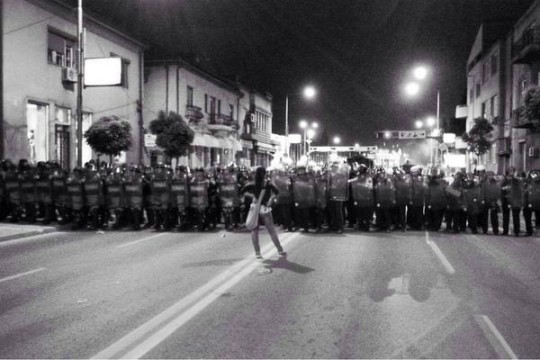
Kumanovo attack
On the morning of 9th of May, around 4:30am, the citizens of Kumanovo were woken by gun shots and explosions. Nobody could understand what was really going on, since the information services were not explaining the situation. Unofficial information about killed civilians and officers were circulating only on social media, but nobody gave an official statement so as to deny or confirm the information. Part of Kumanovo was evacuated during the day. Macedonian media was very obscure with information, while the Serbian ones seemed better informed, and they had terrible news about killed civilians, abandoned borders and closed highways (later all denied and pronounced as speculations). Finally, in the very late evening, the now ex-minister for Internal Affairs Ms Jankulovska gave an official press release stating that 4 police officers were killed in a police action, which, at that moment was over, when in fact police units were clearing the territory “house by house”, after the surrender of 27 “terrorists” who were all arrested and taken into police custody for further interrogation. The citizens were confused by the fact that no authorities went out publicly during the day to calm the citizens down and even more surprisingly, the gunshots and explosions continued after the press.
The next day, 10th of May, finally PM Gruevski along with Spokesman of MIA Mr Kotevski and Minister (now ex-minister) Jankulovska, held presses, officially presenting the entire story. According to them, the “terrorists” entered the country from Kosovo, practiced attacks and smuggled weapons for 18 months. The “terrorists” were highly trained by ISIS and there were warrants issued for them all over Europe. Their plans were to attack malls, rallies etc. Apparently the day before, special units did not manage to arrest or disable all the terrorists as Minister Jankulovska claimed, which led to the death of three officers and “some of the terrorists”. The total of killed police officers in the actions stands at eight.
What is bizarre is that during the arrests and interrogations (police brutality during these actions was suspected again), one of the arrested, negotiated with the revealing of the weapons warehouse and successfully escaped. Ok, so one well-guarded handcuffed foreign ‘terrorist’ managed to escape through woods to at least 20 armed special units members… The motives of the ‘terrorists’ are still unclear. After these official statements, the journalists were struggling to find logic behind the statements and the reported situation; there were many inconsistences between statements, as well as many questions left unanswered, such as: what were the political demands of the terrorists? How is it possible for a group of 30-40 armed people to enter and exit the country for 18 months with nobody noticing? If somebody (security services) noticed why/could they have prevented the killing of 8 young police officers? How is it possible that after the Goshince attack, all alarms and security measures are not taken so eventually “terrorists” end up in a Kumanovo neighbourhood? Why is Kosovo’s Ministry for External Affairs declaring that no border trespassing was evidenced at all, but MIA is claiming that all “terrorists” entered the country from Kosovo? If the Secret Services and MIA knew about the “terrorists” and sent special units to capture the “terrorists” why were less invasive tactics not used in order to prevent human losses? How did mixed Macedonian-Kosovan border patrols, never report trespassing? Why did only some of the arrested “terrorists” have uniforms? How did the “terrorists” know that special units were approaching at 4:30am and immediately responded with explosives and rifles?
These and many more questions, all unanswered by authorities remained to perplex every citizen in Macedonia.
International community and resignations
After the series of turbulent events, and the non-stop protest movement, it was obvious that the political climate in the country will not calm into warm and sunny weather. Too many revolted and unsatisfied citizens were already on the streets, but this time coalesced into a movement with a much bigger purpose – the resignation of the whole Government and seeking criminal, legal and political responsibility. The release of the arrested students during the protests as well the change of the system, not only of the representatives of the political party, was explicitly loudly shouted on the streets. The daily marching was followed by gatherings in front of the Parliament became pressure which was too much to ignore. But the pressure was not only put on the government, or other parties, but also International representatives in the country.
Eventually the EU, US, British, German, French and Italian Ambassadors responded. The Ambassadors held a meeting with PM Gruevski, after which American Ambassador Jess L. Baily gave a joint statement in which the International

Community clearly expressed concern about the capacity and democratic ruling of the country’s Government. The statement was just as explicit regarding the condition of the country and the government’s strategy of ignorance. Changes were requested and necessary. Later that night, three resignations occurred, of the MIA Minister Gordana Jankulovska, Chief of State Security Saso Mijalkov and the Minister for Transport Mile Janakievski. It was more than evident that the reason for this was a political manoeuvre but it was the beginning of meeting the citizens’ demands and a step forward in a very inert authoritative country.
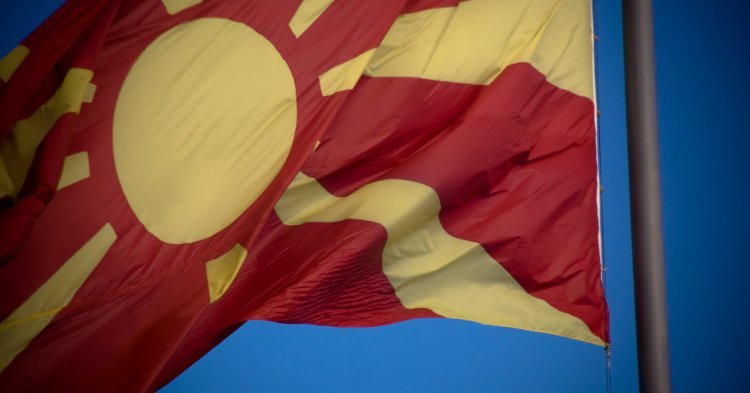
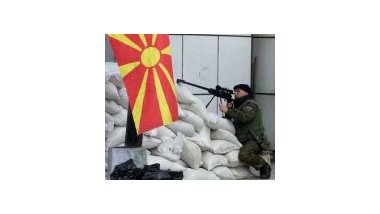
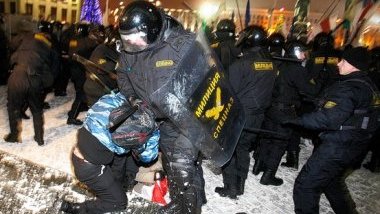
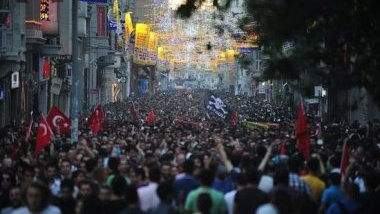

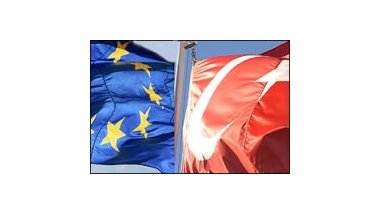
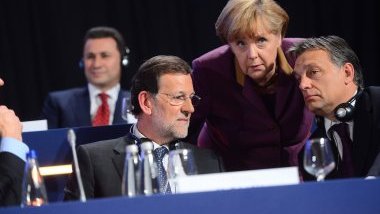
1. On 10 June 2015 at 04:08, by Hoosier Replying to: Macedonia: democracy in crisis or “democracy in bloom”?!
Replying to: Macedonia: democracy in crisis or “democracy in bloom”?!
This article is nothing but Soros propaganda spin. It doesn’t state that the socialist opposition leader has been recorded on video demanding a bribe. So, he is desperate to destabilize the country in order to avoid jail with his party cronies.
2. On 10 June 2015 at 14:29, by Damir Replying to: Macedonia: democracy in crisis or “democracy in bloom”?!
Replying to: Macedonia: democracy in crisis or “democracy in bloom”?!
Hey Hoosier, look at what the New Your times have to say about this, they must be paid by Soros as well.
http://www.nytimes.com/2015/05/15/world/europe/tiny-macedonia-confronts-a-supersize-scandal.html?_r=3
Kind regards from Skopje,
3. On 11 June 2015 at 18:06, by Hoosier Replying to: Macedonia: democracy in crisis or “democracy in bloom”?!
Replying to: Macedonia: democracy in crisis or “democracy in bloom”?!
Yep. How did that go yesterday with the extortionist Zaev?
4. On 11 June 2015 at 18:20, by SBogat Replying to: Macedonia: democracy in crisis or “democracy in bloom”?!
Replying to: Macedonia: democracy in crisis or “democracy in bloom”?!
Hey Hoosier,
I’ve got a question for you - For how long have you been living in Macedonia? If not, then I have another question - For how long have you been following Macedonian politics?
Best regards from Macedonia
5. On 11 June 2015 at 18:44, by Hoosier Replying to: Macedonia: democracy in crisis or “democracy in bloom”?!
Replying to: Macedonia: democracy in crisis or “democracy in bloom”?!
Since ’77. But more so after Tito passed away.
6. On 12 June 2015 at 03:57, by Makedonetz Replying to: Macedonia: democracy in crisis or “democracy in bloom”?!
Replying to: Macedonia: democracy in crisis or “democracy in bloom”?!
It’s true lost of UN explained events but look at the timing! Perfect alignment with big business pipelines... Who has interest in these businesses Soros has been backed by all the Bush presidents Clinton Obama and a large list of media/ investor’s he robbed England’s banks pillaged in Poland helped take down USSR and also Yugoslavia... read up on him and his “friends” who profit from the loss and suffering of humans!
Follow the comments: |
|
